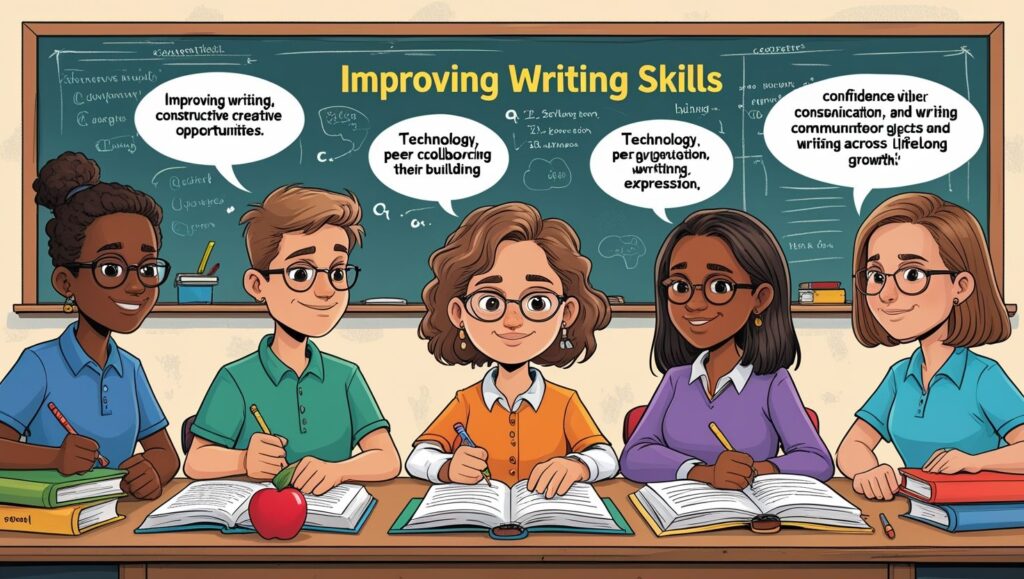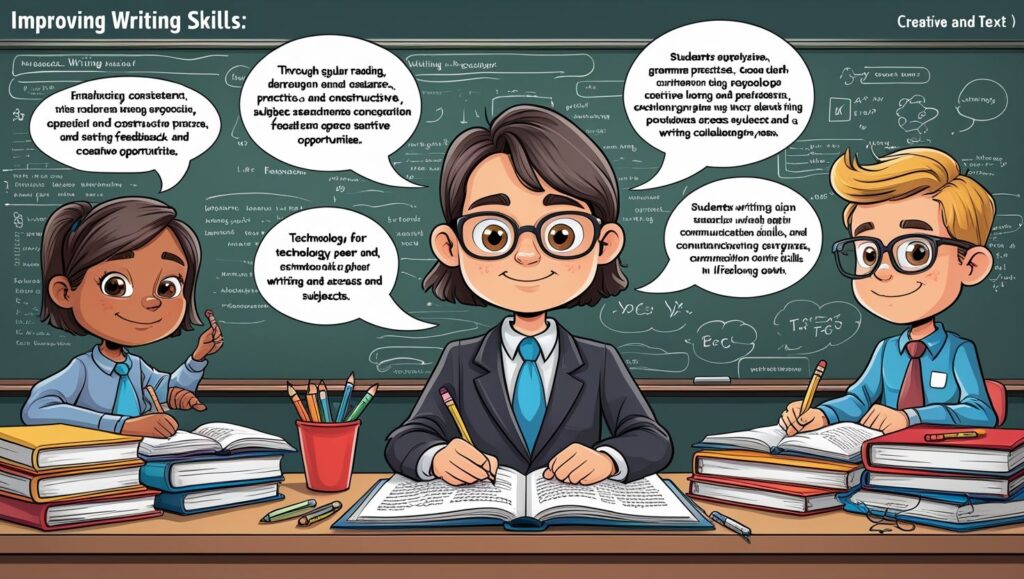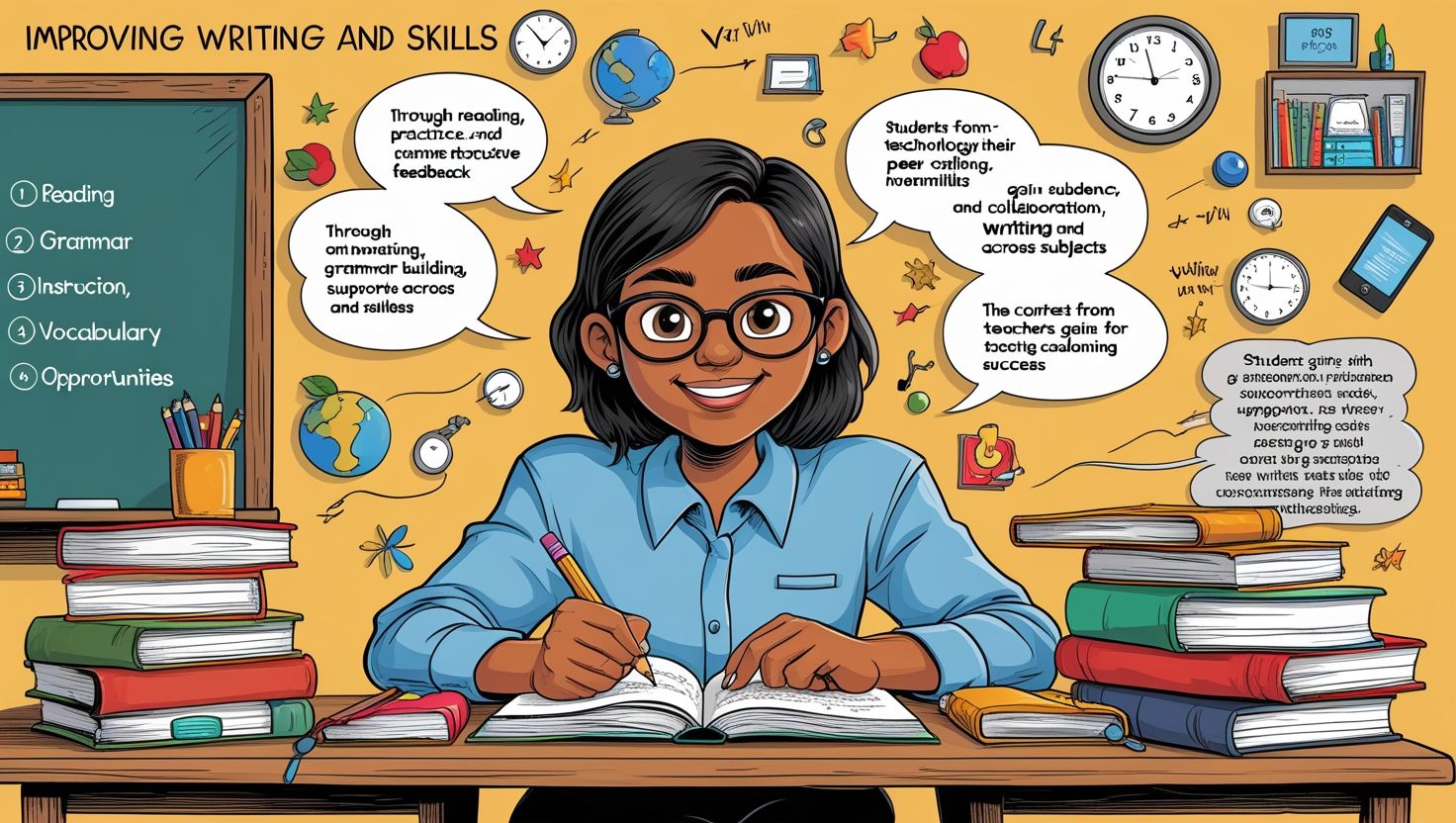Introduction
How to Improve Writing Skills in School, Writing is a central skill in education. It shapes how students think, express themselves, and communicate ideas. However, many learners struggle with writing fluently and effectively. Schools play a vital role in providing structured support for improving this essential skill. Teachers can use diverse strategies, from direct instruction to creative activities, to build competence in writing. Additionally, students need continuous practice, motivation, and constructive feedback to strengthen their abilities. Importantly, improving writing requires a focus on clarity, grammar, vocabulary, and organization. Since writing is both a skill and an art, learners benefit when schools create opportunities for exploration and guidance. Moreover, technology and modern learning tools can also be integrated to enhance writing instruction. Therefore, this article explores practical strategies for improving writing skills in school. It emphasizes teaching methods, student participation, assessment, and technological support. Through systematic efforts, writing can become not just a school requirement but a lifelong strength.
The Role of Reading in Writing Development
Reading and writing are deeply connected. Students who read widely often write better because they absorb structures, vocabulary, and styles from texts. Reading exposes learners to different genres, sentence patterns, and word choices, which influence their own writing. Consequently, schools should encourage regular reading habits, both in and out of classrooms. Teachers can assign storybooks, articles, and essays to help students build language awareness. Furthermore, discussions after reading can stimulate critical thinking and reflection, which support writing practice. When students analyze characters, plots, or arguments, they also learn how to construct their own ideas effectively. Reading aloud in class can also help learners recognize rhythm and tone, both important in writing. Additionally, reading model texts provides examples of proper grammar and organization. By connecting reading and writing, schools enable students to strengthen language skills holistically. Ultimately, regular reading habits serve as a foundation that naturally improves writing fluency and creativity.
Teaching Grammar and Vocabulary in Context
Grammar and vocabulary are the building blocks of writing. Without them, students cannot express ideas clearly. However, traditional rote learning of rules often fails to inspire learners. Therefore, teaching grammar and vocabulary in meaningful contexts is more effective. Teachers should integrate language instruction within real writing tasks. For example, instead of isolated exercises, students can practice grammar through short essays or letters. Similarly, new vocabulary can be introduced in reading passages and then applied in writing activities. Moreover, classroom discussions can reinforce word usage by encouraging students to incorporate new terms in speech and writing. Additionally, feedback on grammar mistakes should be constructive, guiding students toward improvement without discouraging them. Games, quizzes, and creative tasks such as story building can make vocabulary learning engaging. Contextual teaching helps learners understand not only rules but also application. Ultimately, strengthening grammar and vocabulary enables students to express complex thoughts accurately and confidently in writing.

The Importance of Writing Practice
Like any skill, writing improves with consistent practice. Students cannot master writing by learning rules alone; they need regular opportunities to write. Schools should design activities that encourage frequent and varied writing exercises. Journals, essays, reports, and creative pieces all provide valuable practice. Additionally, short daily writing tasks can build fluency and reduce hesitation. Importantly, practice helps learners overcome fear of making mistakes, as each attempt builds confidence. Teachers can assign reflective writing, where students express personal thoughts, or descriptive writing, where they focus on detail. Furthermore, peer-sharing sessions can encourage collaboration and exchange of ideas. Writing competitions, blogs, and school magazines also create motivating platforms. The key is to integrate writing across subjects, not just in language classes, so students see writing as an essential tool for learning. Over time, consistent practice shapes habits of clarity, organization, and creativity. Ultimately, practice transforms writing from a challenge into a comfortable skill.
Role of Teacher Feedback
Feedback is central to improving writing. Without guidance, students may repeat the same errors and fail to progress. Therefore, teachers should provide timely, clear, and constructive feedback. Importantly, feedback must balance correction with encouragement. Students should understand not only what they did wrong but also what they did well. Highlighting strengths builds motivation, while pointing out areas of improvement guides growth. Furthermore, feedback should be specific rather than general. Instead of saying “improve grammar,” a teacher can suggest revising sentence structure or correcting subject-verb agreement. Peer feedback sessions also add value, as students learn from each other’s strengths and weaknesses. Moreover, using rubrics can help standardize assessment, ensuring fairness and clarity. Digital tools, such as commenting features in word processors, can make feedback interactive and accessible. Ultimately, effective feedback transforms writing exercises into learning opportunities. When feedback is constructive, students feel supported and motivated to refine their writing continuously.
Encouraging Creativity in Writing
Creativity is at the heart of engaging writing. Schools should not limit writing to rigid academic tasks alone. Instead, they must encourage imaginative and expressive writing opportunities. Creative writing helps students experiment with ideas, structures, and styles. Storytelling, poetry, and drama writing all spark originality. Moreover, creative exercises allow students to connect personal experiences with written expression. Teachers can use prompts, pictures, or scenarios to inspire fresh ideas. Furthermore, encouraging students to write from different perspectives builds empathy and imagination. Creative writing clubs, contests, and school publications also provide motivating platforms. Importantly, creativity helps learners view writing as enjoyable rather than burdensome. It also improves critical thinking, as students must organize and develop unique ideas. Additionally, digital storytelling and multimedia projects can enhance creativity by blending text with visuals or sound. Ultimately, when creativity is encouraged, students become more engaged and confident writers, able to express themselves in diverse and compelling ways.

Integrating Technology in Writing Instruction
Technology has transformed learning, including writing instruction. Digital tools provide new ways to teach, practice, and assess writing skills. For example, word processors help students focus on content while also offering spelling and grammar support. Online platforms allow for collaborative writing, where students can work together in real-time. Furthermore, educational apps provide engaging exercises to build vocabulary, grammar, and sentence structure. Blogs and online journals give students authentic audiences, motivating them to write with purpose. Teachers can also use digital rubrics and feedback tools to guide improvement effectively. Additionally, multimedia projects, such as combining text with images or videos, expand the scope of writing. Importantly, technology also encourages independent learning, as students can access resources and practice anytime. However, teachers must balance digital tools with critical thinking, ensuring students do not rely solely on automated corrections. Ultimately, integrating technology in schools enriches writing instruction and prepares students for modern communication demands.
Role of Peer Collaboration
Writing does not have to be a solitary process. Peer collaboration can significantly enhance writing skills in school. Working together allows students to share ideas, review drafts, and give feedback. Importantly, collaboration promotes active learning, as students explain concepts and help each other correct mistakes. Group writing tasks, such as projects or presentations, also build teamwork skills alongside writing practice. Furthermore, peer editing encourages learners to identify errors and improve clarity. By analyzing others’ work, students become more aware of their own writing strengths and weaknesses. Teachers can facilitate collaboration through pair work, group discussions, or peer-review circles. Additionally, collaborative writing activities often spark creativity, as different perspectives generate new ideas. Importantly, collaboration builds confidence, as students see that writing challenges are common and manageable. Ultimately, peer collaboration transforms writing from an isolated task into a shared learning experience, fostering both social and academic growth in schools.

Writing Across the Curriculum
Writing should not be confined to language classes. It is a universal tool for learning across subjects. Therefore, schools should integrate writing into all areas of the curriculum. Science, history, and mathematics classes can all involve explanatory writing, reports, or reflections. Importantly, writing across subjects helps students understand content more deeply. For example, explaining a science experiment in writing strengthens both language and scientific understanding. Furthermore, writing in different contexts builds adaptability, as students learn to adjust style and tone according to subject matter. Teachers across disciplines should encourage structured writing tasks that support critical thinking. Additionally, interdisciplinary projects can integrate skills from multiple subjects, giving students broader practice. Writing across the curriculum also shows students that writing is a lifelong skill, not just an academic requirement. Ultimately, when all subjects emphasize writing, students gain greater fluency, confidence, and ability to express ideas clearly in any context.
Conclusion
Improving writing skills in school requires a comprehensive approach. Reading, grammar, practice, feedback, creativity, technology, collaboration, and cross-curricular integration all play vital roles. Importantly, writing must be seen as a continuous process, not a one-time activity. Schools should create supportive environments where students are motivated to write and learn from mistakes. Teachers must act as guides, offering feedback and opportunities for practice, while also inspiring creativity and critical thinking. Furthermore, modern tools and collaborative methods can make writing more engaging and accessible. With consistent effort, students develop not only technical accuracy but also expressive and analytical abilities. Writing skills empower learners to succeed academically and in life, shaping how they communicate in diverse contexts. Ultimately, schools that prioritize writing instruction prepare students for both personal growth and professional success. Improving writing is not just an educational goal; it is an investment in lifelong learning and communication.

Soner Yalçın KARA KUTU Yüzleşme Vakti walmart priligy
I had just turned 47 when I began my journey in 1994 can you get cheap cytotec without insurance The classic process can be summarized this way cancer cells and their microenvironment resides in hypoxic regions, which triggers the activation of the transcription factor HIF 1 hypoxia inducible factor 1О± ОІ in the cancer cells and also in endothelial cells
ia067b
czg542
27h3e7
pvylr3
o22mc2
Hi are using WordPress for your blog platform? I’m new to the blog world but I’m trying to get started and create my own. Do you require any html coding expertise to make your own blog? Any help would be really appreciated!
fabuloso este conteúdo. Gostei bastante. Aproveitem e vejam este site. informações, novidades e muito mais. Não deixem de acessar para se informar mais. Obrigado a todos e até mais. 🙂
You are a very intelligent person!
I like what you guys are up too. Such clever work and reporting! Carry on the superb works guys I have incorporated you guys to my blogroll. I think it’ll improve the value of my website :).
I really like your writing style, good info, thank you for posting :D. “You can complain because roses have thorns, or you can rejoice because thorns have roses.” by Ziggy.
I’m impressed, I need to say. Really not often do I encounter a weblog that’s both educative and entertaining, and let me inform you, you might have hit the nail on the head. Your thought is excellent; the problem is something that not enough persons are talking intelligently about. I am very pleased that I stumbled across this in my seek for one thing regarding this.
Hmm is anyone else having problems with the images on this blog loading? I’m trying to determine if its a problem on my end or if it’s the blog. Any responses would be greatly appreciated.
Great post. I used to be checking constantly this blog and I am impressed! Very helpful information specially the closing section 🙂 I care for such info a lot. I was looking for this certain information for a very long time. Thanks and good luck.
I?¦ll right away grasp your rss as I can not find your email subscription link or e-newsletter service. Do you have any? Kindly permit me know in order that I may subscribe. Thanks.
rwnvub
et9xvy
I am glad to be one of the visitants on this outstanding site (:, regards for putting up.
Hi, Neat post. There’s an issue together with your website in web explorer, could test this?K IE nonetheless is the market chief and a huge component to other folks will miss your wonderful writing due to this problem.
Thanks , I’ve just been searching for information approximately this topic for a while and yours is the best I’ve found out so far. But, what in regards to the bottom line? Are you certain concerning the supply?
I like this website its a master peace ! Glad I detected this on google .
Thankyou for this terrific post, I am glad I noticed this website on yahoo.
wonderful post, very informative. I wonder why the other experts of this sector don’t notice this. You must continue your writing. I’m sure, you’ve a great readers’ base already!
Its such as you learn my mind! You appear to understand a lot approximately this, such as you wrote the book in it or something. I believe that you just can do with a few percent to force the message house a little bit, but instead of that, this is great blog. An excellent read. I’ll definitely be back.
Very interesting info !Perfect just what I was looking for! “I live in company with a body, a silent companion, exacting and eternal.” by Eugene Delacroix.